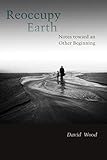Reoccupy Earth : Notes toward an Other Beginning / David Wood.
Material type: TextSeries: Groundworks: Ecological Issues in Philosophy and TheologyPublisher: New York, NY : Fordham University Press, [2019]Copyright date: ©2019Description: 1 online resource (240 p.)Content type:
TextSeries: Groundworks: Ecological Issues in Philosophy and TheologyPublisher: New York, NY : Fordham University Press, [2019]Copyright date: ©2019Description: 1 online resource (240 p.)Content type: - 9780823283545
- 9780823283569
- 304.2 23
- online - DeGruyter
- Issued also in print.
| Item type | Current library | Call number | URL | Status | Notes | Barcode | |
|---|---|---|---|---|---|---|---|
 eBook
eBook
|
Biblioteca "Angelicum" Pont. Univ. S.Tommaso d'Aquino Nuvola online | online - DeGruyter (Browse shelf(Opens below)) | Online access | Not for loan (Accesso limitato) | Accesso per gli utenti autorizzati / Access for authorized users | (dgr)9780823283569 |
Frontmatter -- Contents -- Introduction: Reinhabiting the earth -- Part I. Econvergences -- Chapter 1. On the way to econstruction -- Chapter 2. The idea of ecophenomenology -- Chapter 3. Ecological imagination: a whiteheadian exercise in temporal phronesis -- Chapter 4. The eleventh plague: thinking ecologically after Derrida -- Part II. Experiential pathways -- Chapter 5. Things at the edge of the world -- Chapter 6. Reversals and transformations -- Chapter 7. Touched by touching: toward a carnal hermeneutics -- Part III. Reoccupy earth -- Chapter 8. My place in the sun -- Chapter 9. On being haunted by the future -- Chapter 10. Beyond narcissistic humanism: or, in the face of anthropogenic climate change, is there a case for voluntary human extinction? -- Acknowledgments -- Notes -- Index
restricted access online access with authorization star
http://purl.org/coar/access_right/c_16ec
Habit rules our lives. And yet climate change and the catastrophic future it portends, makes it clear that we cannot go on like this. Our habits are integral to narratives of the good life, to social norms and expectations, as well as to economic reality. Such shared shapes are vital. Yet while many of our individual habits seem perfectly reasonable, when aggregated together they spell disaster. Beyond consumerism, other forms of life and patterns of dwelling are clearly possible. But how can we get there from here? Who precisely is the 'we' that our habits have created, and who else might we be? Philosophy is about emancipation-from illusions, myths, and oppression. In Reoccupy Earth, the noted philosopher David Wood shows how an approach to philosophy attuned to our ecological existence can suspend the taken-for-granted and open up alternative forms of earthly dwelling. Sharing the earth, as we do, raises fundamental questions about space and time, place and history, territory and embodiment-questions that philosophy cannot directly answer but can help us to frame and to work out for ourselves. Deconstruction exposes all manner of exclusion, violence to the other, and silent subordination. Phenomenology and Whitehead's process philosophy offer further resources for an ecological imagination. Bringing an uncommon lucidity, directness, and even practicality to sophisticated philosophical questions, Wood plots experiential pathways that disrupt our habitual existence and challenge our everyday complacency. In walking us through a range of reversals, transformations, and estrangements that thinking ecologically demands of us, Wood shows how living responsibly with the earth means affirming the ways in which we are vulnerable, receptive, and dependent, and the need for solidarity all round.If we take seriously values like truth, justice, and compassion we must be willing to contemplate that the threat we pose to the earth might demand our own species' demise. Yet we have the capacity to live responsibly. In an unfashionable but spirited defense of an enlightened anthropocentrism, Wood argues that to deserve the privileges of Reason we must demonstrably deploy it through collective sustainable agency. Only in this way can we reinhabit the earth.
Issued also in print.
Mode of access: Internet via World Wide Web.
In English.
Description based on online resource; title from PDF title page (publisher's Web site, viewed 02. Mrz 2022)


